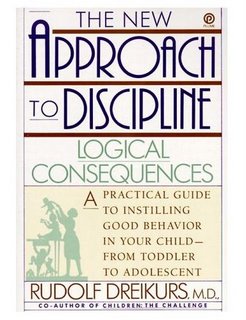Parents and teachers in today’s world seem to be diligently seeking ways to teach kids discipline and self-control. A quick look at any bookstore will turn up hundreds of books about discipline, child-rearing, and behavioral issues. A form of discipline that has been around for decades is that of “logical consequences”. One pioneer in this area was Rudolph Dreikers, whose books are recommended by Montessori teachers everywhere.  I have read his book, Logical Consequences: The New Approach to Discipline, and while it is a little outdated, much of his advice is applicable today. He gives many examples of logical consequences for children in real life situations: if you’re late getting out the door, you miss the bus – and no one drives you to school. If you knock something over and break it, you fix it yourself or pay for it.
I have read his book, Logical Consequences: The New Approach to Discipline, and while it is a little outdated, much of his advice is applicable today. He gives many examples of logical consequences for children in real life situations: if you’re late getting out the door, you miss the bus – and no one drives you to school. If you knock something over and break it, you fix it yourself or pay for it.
Using logical consequences as a form of discipline is extremely effective, but there are some things to take into consideration when using them. I will outline them here:
1. They don’t work well with young children. Children four and under (depending on the child, it could be even older) don’t have a sturdy grasp of cause and effect. You can tell them that you’ll take away their toy if they misuse it, but they might not really understand the implications of that. Once you give them a “consequence”, they may not make the connection between that and their misbehavior. I find that consequences work best for elementary-age kids and up.
2. The consequence must be meaningful for the child. If the child decides that the pleasure of disobeying is more fun than whatever it is that you’ve taken away, they really don’t care. It’s always funny when a kid hits his brother and you take away the toy they were playing with, and then they look at you and shrug and go play with something else. Not really effective.
3. Consequences don’t change a child’s attitude. They may decide to outwardly obey to avoid the negative consequence, but they haven’t changed their heart – they are still rebelling inside. To reach the child in a meaningful way, the consequence may need to be linked to something else – a heart-to-heart talk with a teacher or parent, or some time spent thinking about the offense and why it was wrong.
4. Consequences don’t always deal with the underlying problem that caused the disobedience. For instance, I noticed a few months ago that my son was backtalking a lot. I started giving him consequences (taking away TV shows, toys, etc.) when he backtalked, but the behavior continued. Finally I decided to jot down the circumstances surrounding his backtalk, and it turned out to be very predictable. He backtalked every time he was asked to do something that he didn’t want to do.
We had a conversation about it, and once he saw what he was doing, it made a big difference in his behavior. I won’t say that the backtalking went away completely, but the improvement was dramatic. Also, when he did slip into backtalking again, he knew WHAT he was doing and WHY. Before it was just a bad habit that he did without thinking.
5.You must choose consequences that can be enforced, and that everyone can live with. Many a child has been told by a teacher or parent, “All right, now you have to miss the field trip!” only to get to go on the field trip anyway because it was an unenforceable consequence. Think before you say it, or you might find yourself having to go back on your word.
Do I use logical consequences with my kids? Yes, I do. I think they can be very effective, especially if care is taken to really make the consequence meaningful and relevant. They also work extremely well in group situations, like classrooms and extracurricular programs. I recommend Dreiker’s book to anyone who wants to know more about logical consequences. However, I do use other methods of discipline with my kids as well. I’m very interested in this topic, and in future posts I hope to talk about some other schools of thought – and disciplinary methods – that I’ve been reading about and trying at home.
Resources:
Logical Consequences: The New Approach to Discipline by Rudolph Dreikurs
1001 Natural Logical Consequences by Madalyn Skiles
